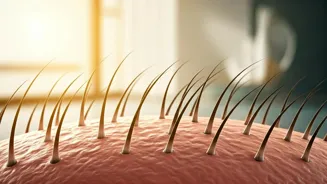Dandruff Defined: Unveiling
Dandruff, at its core, is a common scalp condition characterized by the shedding of dead skin cells. Often appearing as white or yellowish flakes, dandruff
can be itchy and unsightly. This flaking is a result of an accelerated process where the scalp's skin cells mature and shed too quickly. Unlike dry skin, dandruff is often associated with oil production, which is why it is commonly found in areas with high concentrations of oil glands. The severity of dandruff can vary from mild to severe, with the latter potentially leading to scalp inflammation and discomfort. Understanding the fundamental nature of dandruff is the first step in effectively managing and treating this widespread scalp issue.
Myths: Debunked & Dissected
Many myths surround dandruff, leading to confusion and ineffective treatment approaches. A common misconception is that dandruff is simply dry skin. While dry skin can flake, dandruff often involves excessive oil production and a fungal imbalance on the scalp. Another myth suggests that only men experience dandruff; however, this condition affects individuals of all genders. Another persistent myth is that dandruff always leads to hair loss. Although severe, untreated dandruff can contribute to scalp inflammation, potentially affecting hair health, it's not a guaranteed cause of hair loss. The truth is, many factors contribute to hair loss, and dandruff's role is more nuanced than commonly believed. Dispelling these myths is important in developing a clear understanding of the condition and addressing it accordingly.
Stress: A Dandruff Trigger
Stress, often overlooked, can be a significant trigger for dandruff. When the body experiences stress, it releases hormones that can disrupt the natural balance of the scalp. This imbalance can lead to increased oil production and changes in the scalp's microbiome. The altered environment can then promote the growth of Malassezia, a fungus commonly associated with dandruff. Moreover, stress can weaken the immune system, making the scalp more susceptible to inflammation and irritation. While stress itself does not directly cause dandruff, it can significantly exacerbate the condition, making it more severe and difficult to manage. Managing stress through relaxation techniques, exercise, and a balanced lifestyle is therefore essential in controlling and preventing dandruff flares.
Hair Loss & Dandruff: Link?
The connection between dandruff and hair loss is complex and not always direct. Severe, untreated dandruff can lead to scalp inflammation. This inflammation, if persistent, can damage hair follicles, potentially affecting hair growth and leading to hair thinning or loss. Furthermore, excessive scratching due to an itchy scalp can also damage hair follicles and weaken the hair shaft. However, dandruff itself does not directly cause hair loss in most cases. Other factors, such as genetics, hormonal changes, and nutritional deficiencies, play larger roles. Understanding this nuanced relationship is essential. Addressing the underlying causes of dandruff and managing scalp health are crucial for maintaining healthy hair. In many cases, managing dandruff effectively can prevent any hair loss issues.
Treatment: Effective Approaches
Effective dandruff treatment often involves a multifaceted approach. Over-the-counter anti-dandruff shampoos containing ingredients like ketoconazole, selenium sulfide, or zinc pyrithione can effectively control the fungal growth and reduce flaking. Regular use, as directed, is essential for achieving and maintaining results. For more severe cases, a dermatologist may prescribe stronger medications. Beyond medicated shampoos, good scalp hygiene plays a vital role. Washing the hair regularly, but not excessively, to remove excess oil and dead skin cells. Gentle massaging of the scalp while shampooing helps to improve circulation and encourages exfoliation. Additionally, maintaining a healthy lifestyle, including a balanced diet and stress management, can support overall scalp health. Consistent and comprehensive care is the key to keeping dandruff at bay and promoting a healthy scalp environment.
























